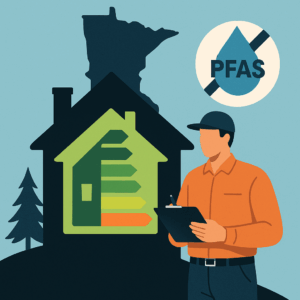What Minnesota’s New Energy Code Means for Your Home Inspection in 2025
 Minnesota just set a bold timeline for energy-smart housing. A 2024 law (HF 5242A) moves the state to a three-year update cycle for the residential energy code starting in 2026, with a target of cutting a new home’s net energy use 70 percent by 2038 (Minnesota’s New Residential Energy Code Update Process: A Major Step Toward Energy Efficiency | Midwest Energy Efficiency Alliance). While that might sound like pure policy talk, it quietly changes what a thorough home inspection should cover beginning this year.
Minnesota just set a bold timeline for energy-smart housing. A 2024 law (HF 5242A) moves the state to a three-year update cycle for the residential energy code starting in 2026, with a target of cutting a new home’s net energy use 70 percent by 2038 (Minnesota’s New Residential Energy Code Update Process: A Major Step Toward Energy Efficiency | Midwest Energy Efficiency Alliance). While that might sound like pure policy talk, it quietly changes what a thorough home inspection should cover beginning this year.
1. Why an energy-focused code matters to buyers and sellers
- More airtight, better-insulated homes
Inspectors will see thicker attic insulation, advanced air-sealing details, and mechanical ventilation systems designed to keep fresh air moving without wasting heat. Verifying that these elements were installed correctly protects buyers from costly comfort complaints later. - Equipment sizing and age
The new code assumes smaller heating and cooling loads. If you are buying an older house that still has a monster 100 k BTU furnace, right-sizing that unit could slash annual bills. A home inspector can flag oversize or end-of-life equipment so you negotiate up front. - Future-proof appraisals
Appraisers already factor energy features into market value. With code updates coming every three years, today’s “average” 2025 build could look dated next to a 2029 neighbor unless sellers document its efficiency. A detailed inspection report provides the proof.
2. Expect a new set of field tests
Municipalities are not yet demanding blower-door or duct-leakage numbers on every resale, but lenders and green financing programs are. Adding an optional blower-door test during inspection offers three benefits:
- Confirms the home meets or exceeds the code in effect when it was built.
- Spots hidden air leaks that foster ice dams and mold.
- Provides baseline data if you refinance through an energy-efficient mortgage later on.
3. Water quality alert – PFAS enters the chat
In April 2024 the Minnesota Department of Health announced 22 public water systems exceeding new federal PFAS limits (Health department says 22 Minnesota water systems have PFAS above new federal limits | MPR News). Cities from Brooklyn Park to Hastings now have five years to install treatment plants, and private-well owners are left to self-test.
For inspectors this means:
- Offer PFAS sampling the same way we already cover radon.
- Interpret lab results for clients unfamiliar with parts-per-trillion numbers.
- Recommend point-of-use filters when results top the new EPA maximum.
Homeowners who can show a clean water report stand out in a market where “forever chemicals” are suddenly headline news.
4. How Mason Home Inspections is adapting
- Energy-ready checklist – We now document R-values, insulation coverage, ventilation type, and mechanical equipment sizing against the forthcoming 2026 code so buyers know where upgrades will be required.
- Optional diagnostic testing – Blower-door and infrared scans are available as add-ons. Early data helps prioritize air-sealing dollars.
- Expanded water testing panel – PFAS, nitrates, lead, manganese, hardness, and coliform bacteria can all be bundled. Results typically arrive in five business days.
- Plain-language reporting – Technical findings are translated into practical steps so clients understand what should be fixed now versus later.
Final thoughts
Minnesota is quietly rewriting the definition of a “code-compliant” home. The upcoming efficiency targets and stricter water-quality rules will reshape purchase negotiations, insurance underwriting, and even resale timelines. A modern home inspection has to look beyond shingles and outlets; it must verify that the invisible systems behind the drywall will meet tomorrow’s standards.
If you’re planning to buy or sell in 2025, schedule an inspection that tackles these new realities. We would be happy to walk the property with you, answer questions, and make sure the next owner steps into a safe, efficient, and healthy home.
Questions? Reach out anytime – we love talking houses, even the drafty ones.

Leave a Reply
Want to join the discussion?Feel free to contribute!